 PENGUIN ENGLISH POETS
PENGUIN ENGLISH POETS
GENERAL EDITOR: CHRISTOPHER RICKS WILLIAM BLAKE:
THE COMPLETE POEMS WILLIAM BLAKE was born in Broad Street in 1757, the son of a London hosier. Having attended Henry Parrs drawing school in the Strand, he was in 1772 apprenticed to Henry Basire, engraver to the Society of Antiquaries, and later was admitted as a student to the Royal Academy, where he exhibited in 1780. He married Catherine Boucher in 1782 and in 1783 published Poetical Sketches. The first of his illuminated books was Songs of Innocence (1789), which, like The Book of Thel (published in the same year), has as its main themes the celebration of innocence and its inviolability. Blake sets out his ideas more fully in his chief prose work, The Marriage of Heaven and Hell (1791), which proclaims his lifelong belief in the moral primacy of the imagination. But in Songs of Experience (1794) he recognizes the power of repression, and in a series of short narrative poems he looks for mankinds redemption from oppression through a resurgence of imaginative life.
By 1797 he was ready for epic; Vala was never finished, but in Milton and Jerusalem he presents his renewed vision of reconciliation among the warring fragments of humanity. Other striking poems of his middle years are the lyrics of the Pickering Manuscript, and The Everlasting Gospel, but in the last years of his life he expressed himself in drawing rather than poetry. Little of Blakes work was published on conventional form. He combined his vocations as poet and graphic artist to produce books that are visually stunning. He also designed illustrations of works by other poets and devised his own technique for producing large watercolour illustrations and colour-printed drawings. Blake died in 1827, an Old Man feeble & tottering but not in Spirit & Life not in the Real Man The Imagination which Liveth for Ever.
ALICIA OSTRIKER is Professor of English at Rutgers University, New Brunswick, New Jersey, USA. WILLIAM BLAKE
The Complete Poems
Edited by ALICIA OSTRIKER PENGUIN BOOKS PENGUIN BOOKS Published by the Penguin Group
Penguin Books Ltd, 80 Strand, London WC2R 0RL, England
Penguin Group (USA), Inc., 375 Hudson Street, New York, New York 10014, USA
Penguin Books Australia Ltd, 250 Camberwell Road, Camberwell, Victoria 3124, Australia
Penguin Books Canada Ltd, 10 Alcorn Avenue, Toronto, Ontario, Canada M4V 3B2
Penguin Books India (P) Ltd, 11 Community Centre, Panchsheel Park, New Delhi 110 017, India
Penguin Books (NZ) Ltd, Cnr Rosedale and Airborne Roads, Albany, Auckland, New Zealand
Penguin Books (South Africa) (Pty) Ltd, 24 Sturdee Avenue, Rosebank 2196, South Africa Penguin Books Ltd, Registered Offices: 80 Strand, London WC2R 0RL, England www.penguin.com First published 1977
Reprinted with revised Further Reading 2004
26 Editorial material copyright Alicia Ostriker, 1997, 2004 Except in the United States of America, this book is sold subject
to the condition that it shall not, by way of trade or otherwise, be lent,
re-sold, hired out, or otherwise circulated without the publishers
prior consent in any form of binding or cover other than that in
which it is published and without a similar condition including this
condition being imposed on the subsequent purchaser
Contents
Preface
William Blake is the rebel
par excellence of English poetry, who sets his face against convention and restriction of every sort, glorifies untrammelled inspiration and defends the artists liberty, in matters of literary format as well as in his religious, political and social ideas. Almost none of his work was published in conventional printed form. Pursuing his vocations as poet and graphic artist simultaneously, he printed most of it himself, with text (in his own orthography) and illustrations commonly intertwined, by a method of etching he invented for the purpose. Copies of individual works often vary, not only in the character of the water-colour timings he gave them, but also in the order of the plates and in words or lines which appear in some copies but are deleted in others. Blakes spelling, punctuation and grammar obey his individual temperament.
Many of his poems, including some major ones, exist only in much-revised manuscript form. No conventionally type-set edition of Blakes poetry can compete, either in beauty or in clarity, with the original illuminated books produced by the poet; neither can it suggest the full complexity of the texts in manuscript. Given these limitations, however, the intention of this edition is to reproduce the work with as much fidelity as possible to the forms in which he wrote it. Improvement makes strait roads; but the crooked roads without Improvement are roads of Genius, Blake remarked. Intrigued readers may be lured onward to the originals, or to the many excellent facsimile editions of them which fortunately exist today. Spelling, grammar, punctuation.
Most readers will not be troubled by Blakes often archaic or eccentric spelling, his frequent use of capitalization for emphasis, his predilection for the rapid & as opposed to the conventional and, and his sometimes crude grammar. These peculiarities have usually been accepted by Blakes editors and readers alike as quirky but charming. A greater stumbling-block is Blakes punctuation, which is at all times idiosyncratic, and at some times, particularly in the manuscript poems, virtually non-existent. Most standard editions of Blake have supplied a conventional punctuation, but to alter in this matter is clearly to distort. I have therefore followed the procedure of David V. Erdman in The Poetry and Prose of William Blake, retaining the poets punctuation and non-punctuation intact.
As a rule, any punctuation mark may be taken simply as a sign for a greater or lesser pause in the flow of language, rather than as an indicator of grammatical relationships. With a little relaxation and practice, the reader will find that this is less difficult than it appears at first, and finally that it may create a sense of freedom and buoyancy, and an openness of syntactic construction, which bring considerable aesthetic and intellectual pleasure. Revisions. In the presentation of textual variations, emendations, revisions, etc., a distinction is made between Blakes manuscript poems and his finished work. For poems which Blake published (or had published or printed for him) in any form, and which we may thus suppose to be finished, the relatively few variations which exist are presented in the Notes. For poems which exist only in manuscript form, this material is incorporated in the text through italics and brackets, reproducing as far as possible the condition of the texts in their workshop state, with successive stages of revision evident as one reads along.
The assumption here is that unfinished poems should not be presented to the eye as if they were finished, and vice versa; and that the reader will benefit from an opportunity to sense Blakes verse both as working process and as completed product. In this respect, the innovative and successful procedure of Geoffrey Keyness Nonesuch and Oxford editions of the Complete Writings is followed with gratitude. Texts. The texts on which the present edition is based are those of David V. Erdman, The Poetry and Prose of William Blake, Doubleday, 1970. This volume should be consulted for complete detail in regard to Blakes revisions, and for full discussion of textual complexities.
There are some changes, particularly in punctuation. The marks !, ?, : and ; are often difficult to distinguish in Blakes calligraphy. Erdman commonly transcribes ! where I find a colon or semi-colon. Blakes full stops and commas are also difficult to tell apart, and he is rather skimpy about the latter. Thus in works where both . and , appear, they are retained (but the readings sometimes disagree with Erdmans).


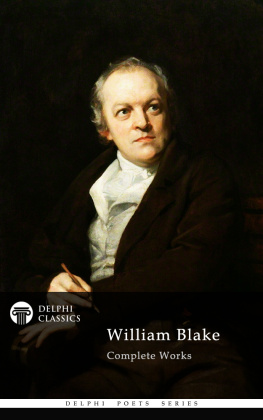
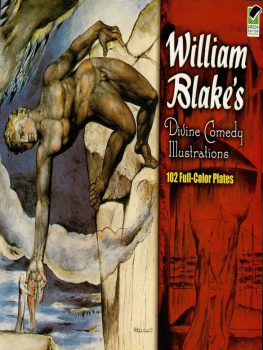
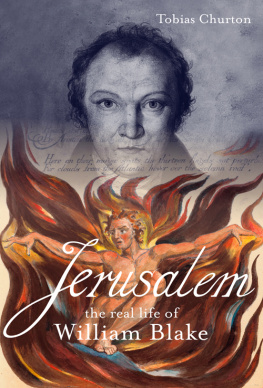
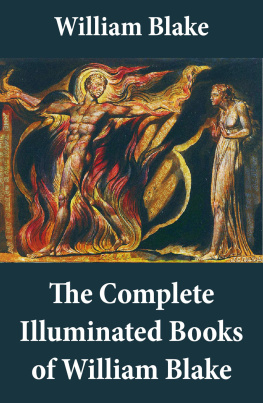

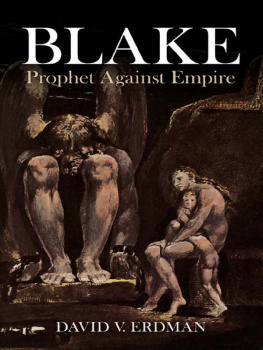
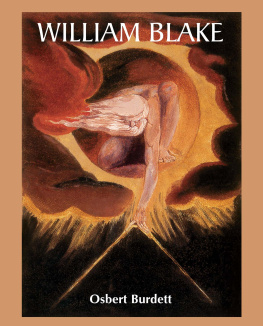
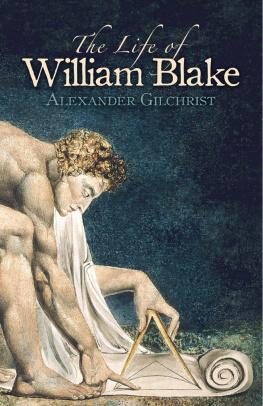
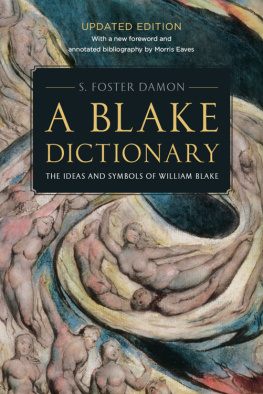
 PENGUIN ENGLISH POETS
PENGUIN ENGLISH POETS